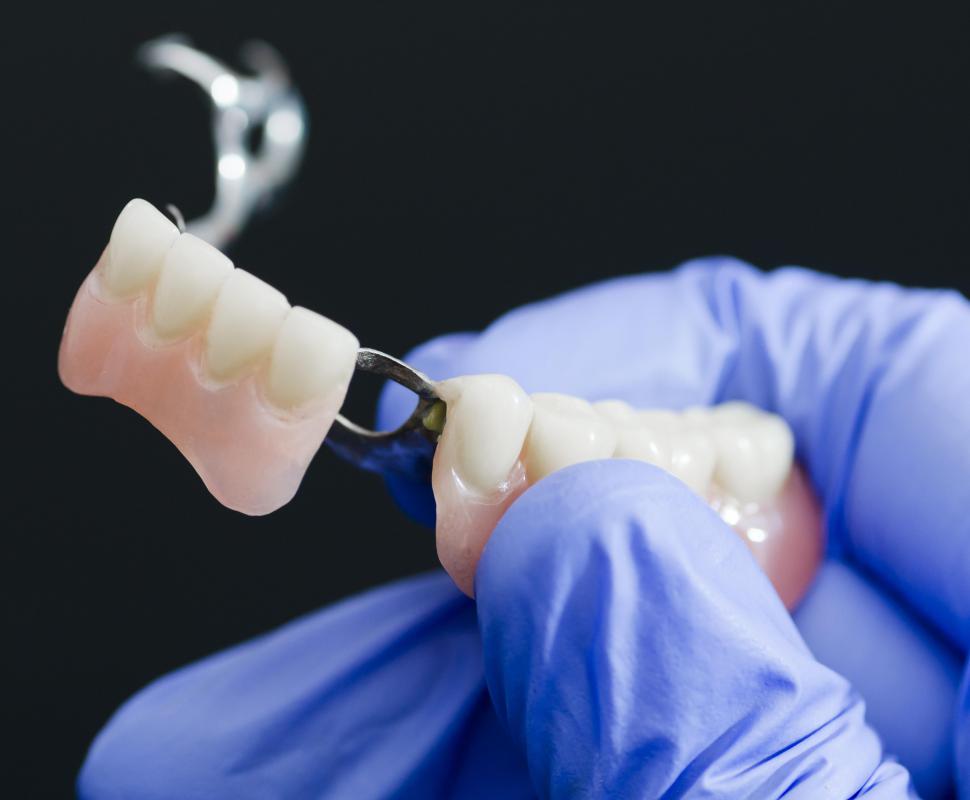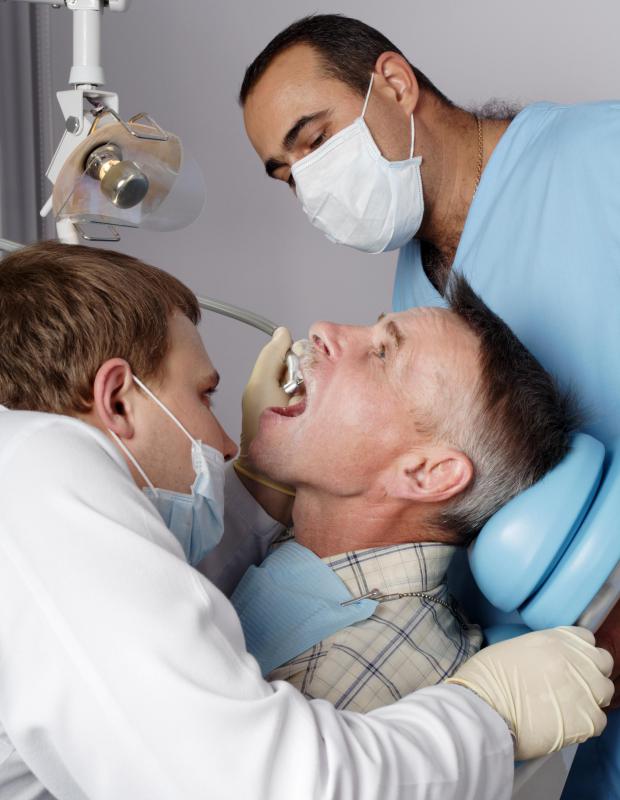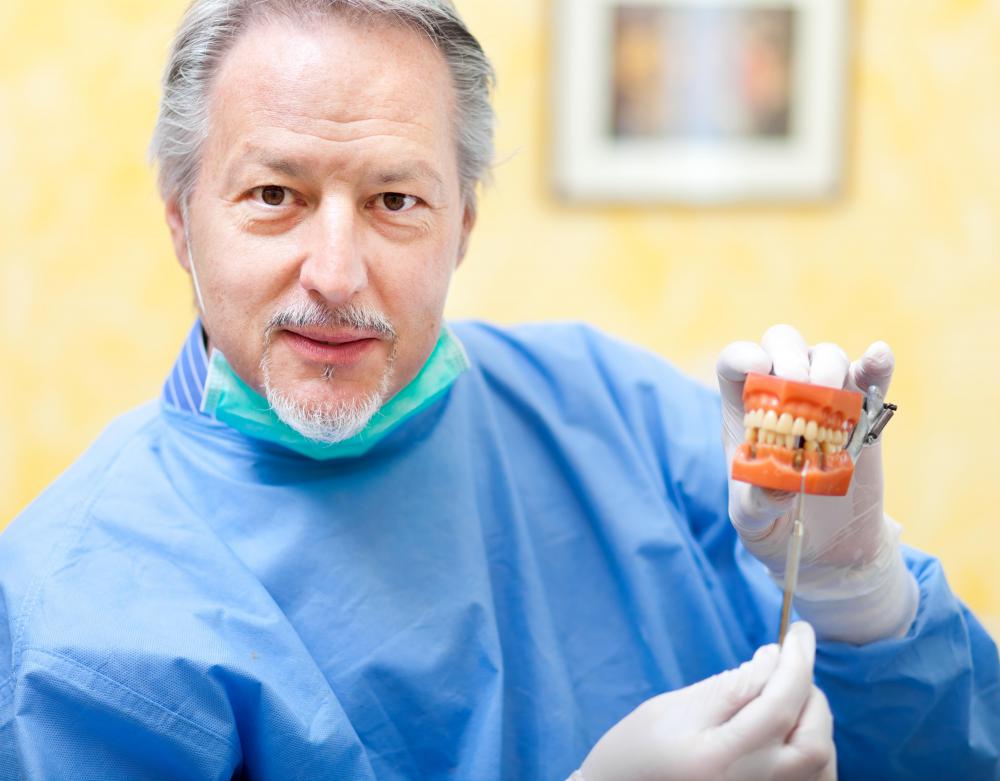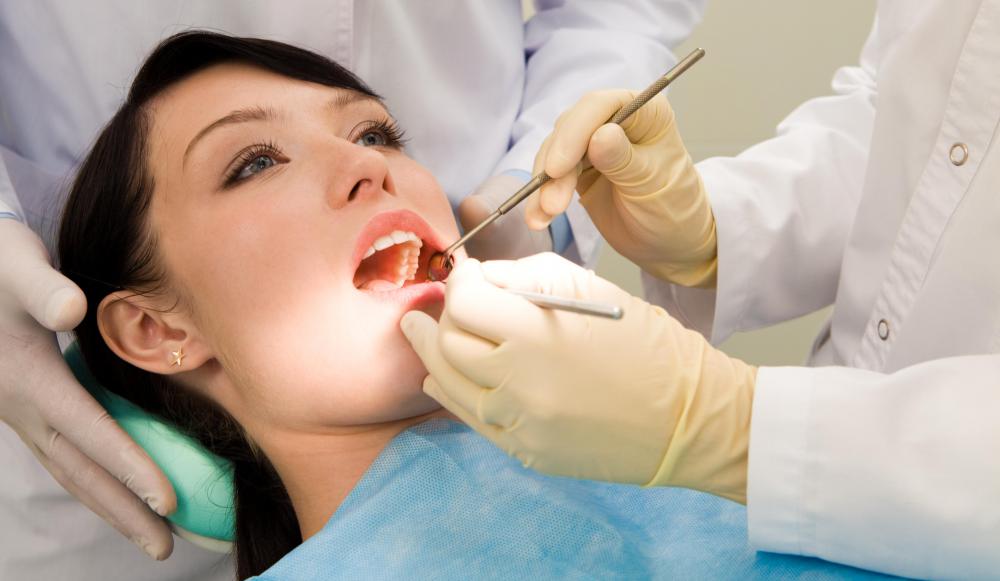At WiseGEEK, we're committed to delivering accurate, trustworthy information. Our expert-authored content is rigorously fact-checked and sourced from credible authorities. Discover how we uphold the highest standards in providing you with reliable knowledge.
What is Denture Adhesive Cream?
Denture adhesive cream is a product that is used to keep dentures in place during normal daily activity. It works by creating a bond between the dentures and the gums so that they do not fall out or shift during regular use. The cream is applied in an even layer to the part of the dentures that is intended to fit against the gums. Once this layer has been applied, the dentures can be fitted into the mouth so that they are fully connected to the gums.
One of the main drawbacks to wearing false teeth is that they can shift and move at inopportune moments. This can create social awkwardness and can also make speaking and eating difficult. Without the use of an adhesive cream, dentures can also fall out or change position radically within the mouth. Denture adhesive cream is intended to reduce the occurrence of such movement and shifts.

There are a number of different denture adhesive cream on the market. Choosing the right one can be difficult. Dentists and people who wear false teeth can offer suggestions and recommendations for different products, but finding the best denture adhesive cream might ultimately come down to a process of trial and error. This is especially true because many people find that each denture cream, even those that are marketed as being flavorless, has a slightly different taste. Depending on one's preferences, the taste of a denture cream will be a deciding factor when choosing the best product.

Some companies that manufacture denture adhesive cream and related products also make adhesive strips for false teeth. These strips, when fitted into the dentures, work to create a bond to the gums much like the cream does. Some people find these strips to be more useful than the cream because they are pre-packaged and create less of a mess than the cream. Others prefer to use the cream so that they can regulate the thickness of the layer of adhesive.

Most adhesive creams for false teeth are intended for use during the day. At night, dentures should be cleaned and properly stored. There are a number of cleaning solutions that can be used to remove leftover denture adhesive cream and clean away any food particles that became lodged in the false teeth during the day. It is advisable to clean dentures and scrub them with a denture brush on a daily basis.
AS FEATURED ON:
AS FEATURED ON:
















Discussion Comments
I tested OlivaFix denture adhesive cream and I'm very happy with it.
I have worn dentures for many years and haven't really found much difference in what kind of cream I buy. I just know that I always make sure I have some on hand.
There is no way I feel confident to speak or eat in front of people if I don't have some kind of adhesive cream on with my dentures.
In the past, I have had more than one embarrassing situation, so always make sure this doesn't happen again. Of course, there is never a 100% guarantee, but using a secure denture adhesive cream makes all the difference in the world.
@burcinc-- No, it's not painful and I've never had trouble when removing them.
It might be difficult to remove if you apply too much adhesive cream, and I think that's a common mistake. A pea sized amount of the cream in two or three spots is plenty to attach the dentures.
When it's time to remove them, I gargle with warm water for a minute or two to soften the cream. Then, I rock the dentures slowly from side to side and it comes off right away. If I accidentally applied too much cream, then I gargle with warm salt water which helps detach the cream from my gums.
I use a very soft toothbrush to clean the adhesive off my gums and dentures. I add the denture cleaner to water and soak my dentures in them. They're not meant to be used in the mouth as far as I know. I suppose you don't have to use a denture cleaner, but it's the best way to clean dentures and remove adhesive cream off of it in my view.
Isn't it hard to remove the dentures at night when you apply adhesive cream on them?
If the adhesive keeps the dentures in place, how do people finally remove them? Does it hurt?
Do you have to purchase the denture cleanser with the adhesive cream and use it while it's in your mouth so that it comes off?
I sure hope not, it sounds like a difficult and annoying task to do everyday.
My mom has partial dentures. She wasn't using denture adhesive cream at first but it started to bother her after a while. The problem was not so much that they were moving around, because I guess that's not really a problem with partial dentures. Partial dentures have a hook system that keeps them in place and in line with real teeth.
My mom decided to use the adhesive because food was getting under the dentures. She said it was uncomfortable because she could feel the food particles, not to mention that they would cause foul mouth odor after a while.
So she picked up the first adhesive she found at the store, I think it's called Effergrip denture adhesive cream. The brand doesn't really matter because they're all basically the same.
But she's much more comfortable with her dentures when she uses the adhesive. She feels less conscious about them and doesn't have to worry about the food particles getting in there. She can wear it from morning to night and removes and cleans it before she goes to bed.
Post your comments